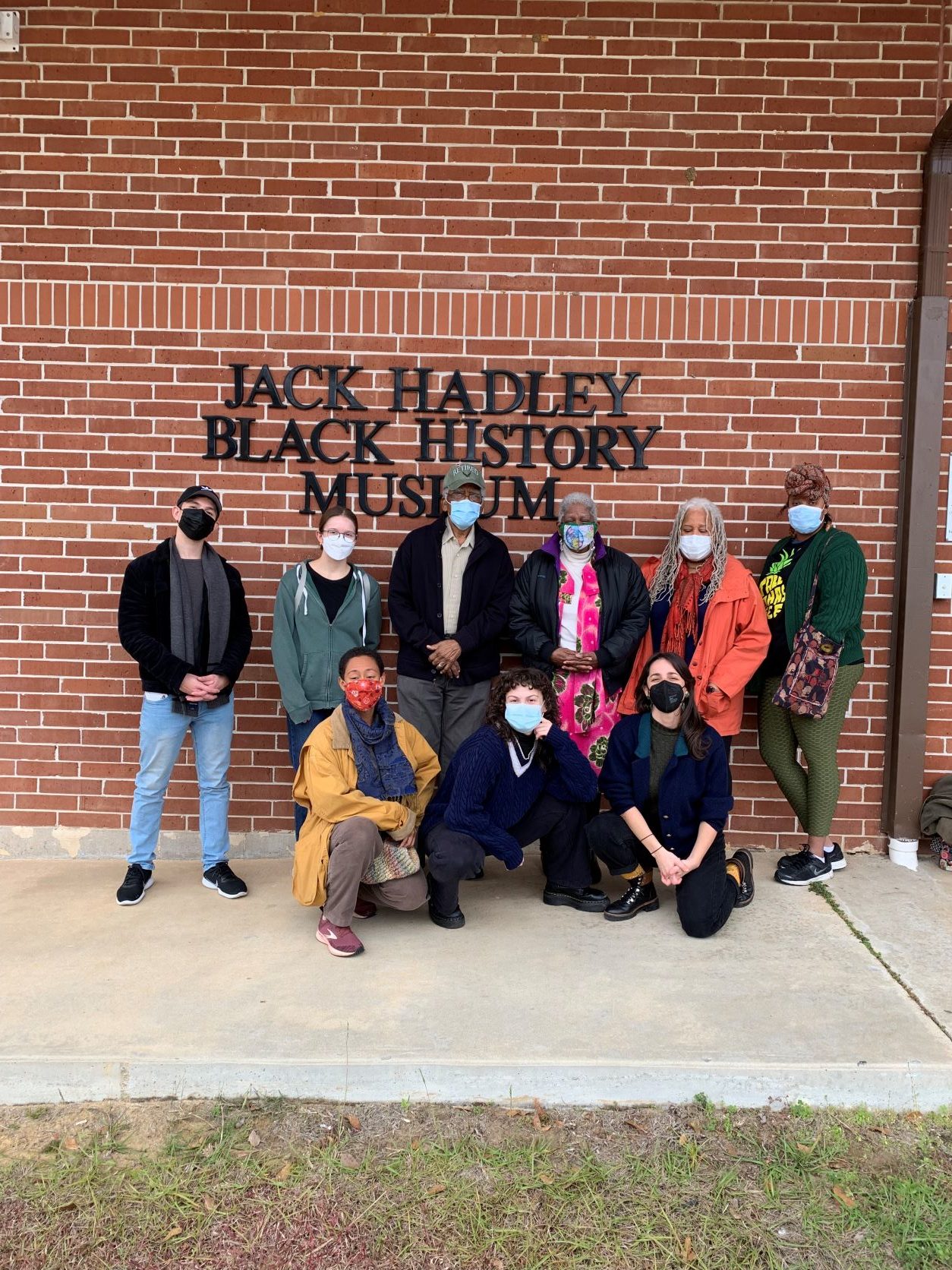 Public performing intellectual, Dr. Karen Wilson-Ama’Echefu, led a ten-day creative residency on the subject of “Repair, Reparation, and Healing” at Florida State University in February 2022 as part of their ongoing creative research as dance, song, story collective Structures for Change.
Public performing intellectual, Dr. Karen Wilson-Ama’Echefu, led a ten-day creative residency on the subject of “Repair, Reparation, and Healing” at Florida State University in February 2022 as part of their ongoing creative research as dance, song, story collective Structures for Change.
Organized by School of Dance faculty Hannah Schwadron and Irvin Gonzalez, the residency was sponsored by the FSU Civil Rights Institute and FSU’s Rodger Belman Fund in Dance, which honors the spirit of the late choreographer Rodger Belman’s work through dance making practice that embraces collaboration, non-traditional spaces, and/or working across disciplines within the community.

The residency explored five elements of reparation based on those identified by the Office of the UN High Commissioner for Human Rights Rule of Law Tools for post-conflict States Reparations Programs: acknowledgement, rehabilitation, restitution, compensation, and the promise that destructive targeted behavior will neither continue nor occur again. As Dr. Karen wrote for our performance note, “this work reminds us that healing is not merely the return to functionality but the establishment of wholeness both in the individual and in community.”
During her time in Tallahassee, Mama Dr. K joined School of Dance and Young Dancer’s Workshop classes by day and dance studio by night while enjoying research trips to the Bradfordville Blues Club, the Jack Hadley Black History museum, and the historic Imperial Hotel, a jazz/blues landmark currently under exciting reconstruction. In addition to Schwadron and Gonzalez, she was joined by Chair of the School of Dance, Anjali Austin, composer/musician Farai Malianga, Science Ed PhD candidate and dancer Ivanna Pengelly, Art Therapist and Mental Health Specialist in Racial Trauma April Fitzpatrick, and School of Dance students Maria White, Anabel Bordelon, Taylor West, Kelly Chase, Elizabeth Zuccaro, and Zoe Brown.
 As part of residency activities, Doby Flowers and Bridgett Birmingham of FSU’s Civil Rights Institute welcomed Dr. Karen to help launch this month’s African American history events in an evening of performance on residency themes. The intimate gathering included celebration of African diasporic cultural tradition through Dr. K’s facilitation of children’s games and songs as well as line dance that spoke to the rehabilitative and reconstitutive aspects of her research on Black life in the US. Introducing movement and music “linked at the rhythm joint” through what she calls “Multilayered Interactive Pulse System,” Dr. K engaged all present in the residency’s “repair rep” which named the group’s improvisatory play with movement concepts like “Waste to the ground”, “Knee Bone Bent”, “Spine Flippin”, and “the Get Down” principle; all dance practices she includes as part of the larger “West African Diasporic Blues Complex” she studies and performs. At the end of the night, instead of Q&A, the focus turned to who was in the room, as local changemakers from the Tallahassee Bail Fund, the Florida Rights Restoration Coalition, Ayoka West African Dance and Drum, FAMU’s jazz studies, the Tallahassee Chapter of the Links, Inc., and the Florida Council on the Social Status of Black Men and Boys introduced themselves to Wilson-Ama’Echefu and each other.
As part of residency activities, Doby Flowers and Bridgett Birmingham of FSU’s Civil Rights Institute welcomed Dr. Karen to help launch this month’s African American history events in an evening of performance on residency themes. The intimate gathering included celebration of African diasporic cultural tradition through Dr. K’s facilitation of children’s games and songs as well as line dance that spoke to the rehabilitative and reconstitutive aspects of her research on Black life in the US. Introducing movement and music “linked at the rhythm joint” through what she calls “Multilayered Interactive Pulse System,” Dr. K engaged all present in the residency’s “repair rep” which named the group’s improvisatory play with movement concepts like “Waste to the ground”, “Knee Bone Bent”, “Spine Flippin”, and “the Get Down” principle; all dance practices she includes as part of the larger “West African Diasporic Blues Complex” she studies and performs. At the end of the night, instead of Q&A, the focus turned to who was in the room, as local changemakers from the Tallahassee Bail Fund, the Florida Rights Restoration Coalition, Ayoka West African Dance and Drum, FAMU’s jazz studies, the Tallahassee Chapter of the Links, Inc., and the Florida Council on the Social Status of Black Men and Boys introduced themselves to Wilson-Ama’Echefu and each other.
This residency was sponsored by the FSU Civil Rights Institute and the Rodger Belman Fund in Dance, which honors the spirit of Belman’s work through dance making practice that embraces collaboration, non-traditional spaces, and/or working across disciplines within the community.